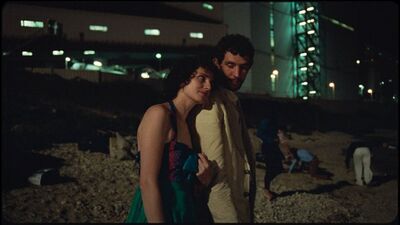
I wanted to ask you about capitalism’s role in the film. Obviously, they’re removing these antiquities, not just to have that connection with history, but they are then selling them on the black market. You have that great scene on the boat with your sister Alba. I’d love to hear your thoughts on how capitalism comes in and changes how we interact with our own history, in that it causes us to place monetary values on things instead of internal values.
The movie talks about the arrival of materialism in the deepest sense of this term, because clearly already in the 1980s this economic model, based on consumerism, had already gained ground that was already established. But in my opinion, deep down in the human soul, until the 80s, it wasn’t like that. People would still talk to their washer or they would pray to the oven so that the bread would rise properly. Objects were still full of an invisible mystery, even consumer goods up until the 1980s. Then in the 1980s, all this world disappeared. Then the model that is based on just making money and material things, and money being the only way to empower oneself. This kind of materialism becomes deeply rooted, so that not only people like this are not the bad ones in the society, they are the product of society. They are a product of the society that tells its children there is nothing that’s invisible anymore, everything is visible, and you can buy and sell anything and everything.
So in the movie, I wanted to create an image of what capitalism is for me. And that image is that of a bunch of dogs growling at each other and fighting with each other, where the small dog and the big dog are all the same. There isn’t even that division anymore between the buyer and the seller. They’re all there to shout at each other to growl at each other, all around a bone. Arthur takes away that bone from the world of commerce, from the world of the living, and he throws it in the water.
So definitely, there’s a criticism, just like there is in all of my movies, of this world that is made just of things. And there is a desire to talk about the invisible layer that is in things, and hopefully, there can be more of a focus on that going forward.
You’ve mentioned Agnès Varda’s “Vagabond” as an inspiration in the past, so I was wondering if there are any other filmmakers who are women or films directed by women from the past or present that really inspire you as an artist or as a person who loves film?
There are many women filmmakers who are inspiring, like Agnès Varda, so it’s difficult to single out just one. Having said that, there are also always too few. I wish there were a lot more of them. It is about time because often women have a very different way of storytelling compared to men. I think this is an advantage also for men, who need to know how women see the world. Clearly over the millennia we have developed a different way of telling our stories, a different perspective on things. I believe it would be very important for there to be a lot more women filmmakers. I’m trying to think of one name above all. Of course, I am very tightly connected to Jane Campion, who is not only a great filmmaker, but also a friend to me, just the way Agnès Varda was. If I have to mention one filmmaker who has deeply inspired me, and who truly made me want to be free, it is a movie by Kira Muratova called “Getting to Know the Big, Wide World.” If I had to single out one, it would maybe be that.

